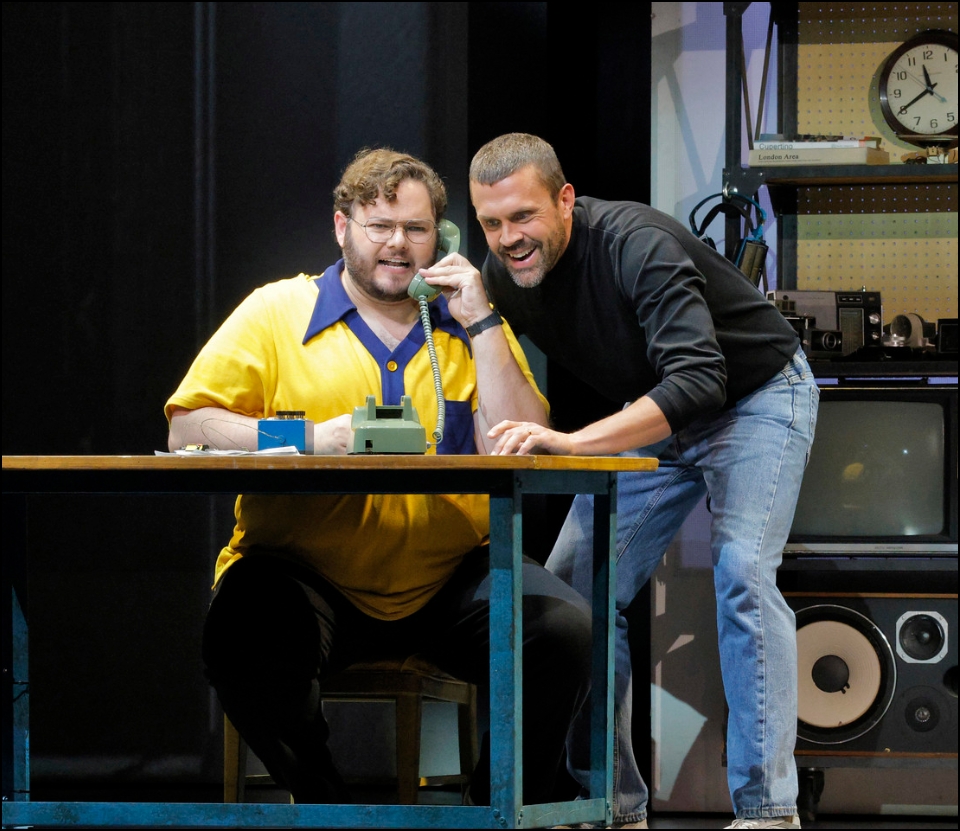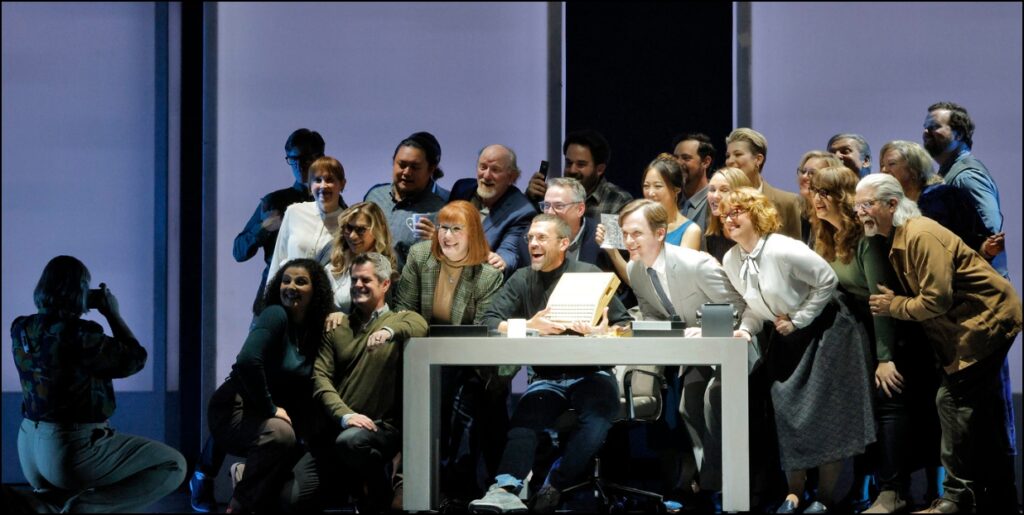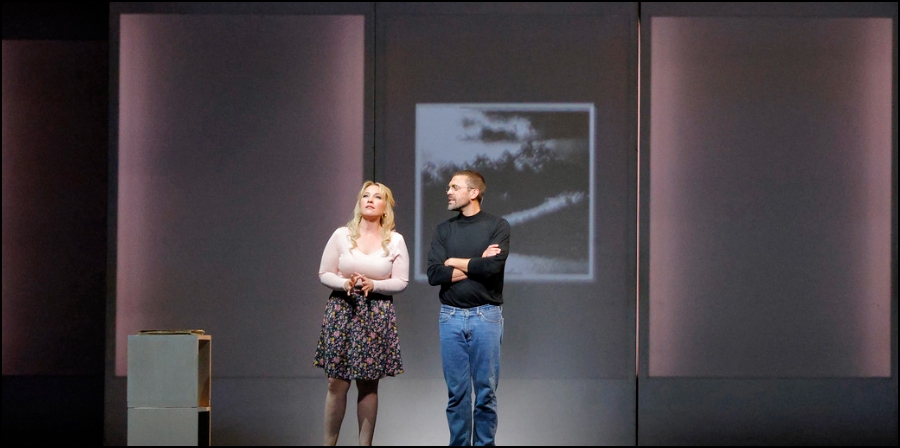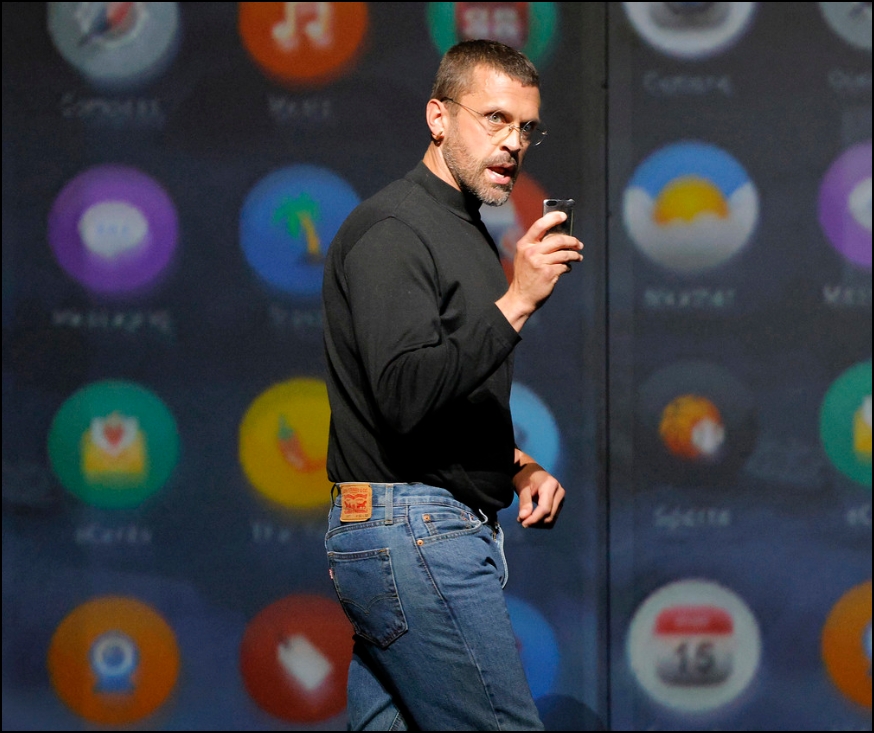By Jeff Dunn
Steve Jobs rode the crests of waves of computer technology that have transformed society.
In The (R)evolution of Steve Jobs we experience his growth, wipeout, and spiritual arrival on a farther shore. The opera is a triumphal result of Mason Bates’ continually engaging, effervescent score; Mark Campbell’s tersely masterful 18-scene libretto; the design teams’ fabulous blending of set, lighting, sound, and projections; and flawless orchestral and vocal performances under the direction of Michael Christie. It is not to be missed.

Most significant to me was Bates’ mastery of orchestration, and deepening range of emotive expression. Rather than use melodic leitmotivs as Wagner did to distinguish characters, he uses groups of instruments: guitar and percussion for Jobs (superb baritone Joseph Lattanzi), strings for his wife (luscious mezzo Sasha Cooke), flutes for his earlier girlfriend (plaintive soprano Olivia Smith), saxophones for his Apple 1 partner (powerful tenor Bille Bruley), and Asian gongs and other flavorings for his Zen mentor (rich bass Wei Wu).
…Most significant to me was Bates’ mastery of orchestration…
In Bates’ earlier orchestral music, I heard an heir to John Adams’ post-minimalist aesthetic leavened by experimentation with added electronica. But in Jobs, Bates has matured beyond Adams with the use of tonal and triadic effects to inject warm-heartedness into the mix via the string section, much as the Finnish composer Einojuhani Rautavaara did in his ground-breaking Cantus Arcticus and later symphonies.

Campbell’s dramatic and often ironic instincts are ever present. Jobs is worth its price in gold for Scene 12 alone. In it, Jobs browbeats his Apple 1 co-creator into quitting, denies siring his live-in girlfriend’s child, rejects seven proposals from seven different designers, refuses to support the girlfriend financially, even after DNA proof, and gets kicked to tech “Siberia” by his company’s board. Jobs tries to explain it all in the next scene to his post-mortem spiritual advisor, “I was only seeking perfection.” All of this is peppered with Bates’ most frenetic accompaniments.
The staging by Victoria Tzykun is simplistic, with giant monoliths silently wheeled around by (mostly) unseen “mover” stage staff. On these are projected a dazzling array of computer-board circuits, lighting effects, and contemplative outdoor scenes. This eye candy has many calories, appropriate to the vast fortunes swirling about Silicon Valley.

Finally, near the close of the opera, Campbell has Job’s wife deliver a moral to a communication-obsessed society: “Glance at the smile of the person sitting right there next to you. Look up, look out, look around. Be here now.” I did so and wondered, will technology take us safely to a New World beach, or will we too wipe out, even more permanently? I think Surfer Steve tells us in this opera that we will make it.
-30-
 Jeff Dunn is ASR’s Classical Music Section Editor. A retired educator and project manager, he’s been writing music and theater reviews for Bay Area and national journals since 1995. He is a member of the San Francisco Bay Area Theatre Critics Circle and the National Association of Composers, USA.
Jeff Dunn is ASR’s Classical Music Section Editor. A retired educator and project manager, he’s been writing music and theater reviews for Bay Area and national journals since 1995. He is a member of the San Francisco Bay Area Theatre Critics Circle and the National Association of Composers, USA.
His musical Castle Happy (co-author John Freed), about Marion Davies and W.R. Hearst, received a festival production at the Altarena Theater in 2017. His opera Finding Medusa, with librettist Madeline Puccioni, was completed in January 2023. Jeff has won prizes for his photography, and is also a judge for the Northern California Council of Camera Clubs.
| Production | The (R)evolution of Steve Jobs |
|---|---|
| Musical Direction | Michael Christie |
| Stage Direction | Kevin Newbury |
| Producing Company | San Francisco Opera |
| Production Dates | Thru Oct 7th |
| Production Address | 301 Van Ness Ave, SF, CA |
| Website | www.sfopera.com |
| Telephone | (415) 392-4400 |
| Tickets | $33-$426 |
| Reviewer Score | Max in each category is 5/5 |
| Overall | 4.5/5 |
| Performance | 4.5/5 |
| Libretto | 5.0/5 |
| Stagecraft | 4.5/5 |
| Aisle Seat Review PICK? | YES! |

